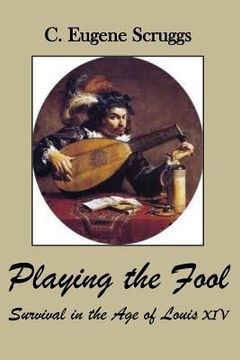Reseña del libro "Playing the Fool (en Inglés)"
Playing the Fool is an historical novel set in seventeenth-century France and Italy. All the major characters in the novel are real-life figures living in this exciting and transitional period. Among the players are Cyrano de Bergerac, D'Artagnan, Cardinal Richelieu, Louis XIII, Lully, Mazarin and, of course, Louis XIV, the Sun King. The princiipal player and the narrator of the story grew to manhood during the free-wheeling and swashbuckling years of Henri IV and the Regency of Marie de Medici. He survived the tyranny of the wily Richelieu and eventually found himself struggling to survive in the reactionary reign of the Sun King. This narrator is Charles Coypeau, scion of a Parisian lawyer and a bella donna from Italy with a golden voice and a shart tongue. Charles was very much a child prodigy with a gift for music and a gift for languages. He rebelled against the wishes of his father who sought to force the young boy to prepare for the legal profession. After his mismatched parents separated, the quick-witted prodigy managed to escape temporarily from his father's residence twice before the age of ten. Early on, young Charles found he could survive in a cruel world by using his wits and playing the fool, sometimes as a magician, sometimes as a fortune-teller, and always as an entertainer. Unappreciated in his father's house, Charles came under the humanizing influence of his maternal grandfather, Guiseppe Agnani, who once crafted lutes and violins in the workshop of the Amati brothers in Cremona, Italy. Grandpapa Guiseppe introduced Chjarles to the Parisian acting and music scenes. He took the boy to see the Commedia dell'arte and the local comic players. Obviously, life among such exciting people was preferable to the stodgy household of a lawyer. Charles was hooked to the art world. By the age of seventeen Charles was on his own in the South of France and survived playing the lute and singing for wealthy bourgeois and nobles, and by entertaining in flea-bag hostels for room and board. When he returned to Paris his life was radically changed when Charles met and became good friends with Cyrano de Bergerac and the young Jean-Baptiste Poquelin, the former who dreamed of space travel and the latter who dreamed of creating a new kind of theater. During the chaotic years of civil strife following the deaths of Richelieu and Louis XIII, Charles became a very successful creator of humorous travesties of classic Latin compositions. His linguistic virtuosity and his newfound fame led to the creation of a nom de plume. For this important cognomen, Charles chose d'Assoucy, soon simplified to Dassoucy. His caree in music also flourished for a time. Dassoucy created the first comic-opera written in the French language and composed musical interludes for the famous dramatist, Pierre Corneille, and France's greatest comedian and playwright, Moliere (J-B Poquelin). Unfortunately for Dassoucy's career, the French Academy set stringent rules for the creation of poetry and drama which tended to stifle creative imagination. Dassoucy ran afoul of these literary dictators and of newly formed religous cabals that sought to dictate morality. Dassoucy was in and out of jail on four occasions. His main support came from his friendship with Moliere, Louis XIV's favorite dramatist, and from the family of actors who formed the core of Moliere's troupe. Often living off his lute playing and his winning at the gaming tables, Dassoucy finally found a steady position as a musician in the court of the Sun King.

